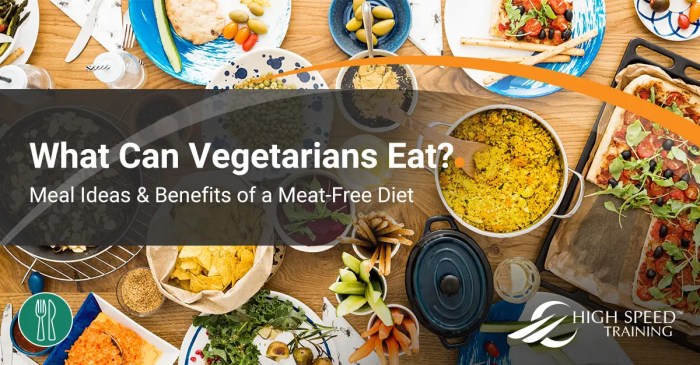Why eat vegetarian? Embark on a journey to discover the myriad benefits of a plant-based diet, encompassing enhanced health, environmental sustainability, and ethical considerations. From reducing the risk of chronic diseases to promoting compassion towards animals, vegetarianism offers a transformative path towards a healthier and more mindful way of life.
The health advantages of a vegetarian diet are undeniable. Studies have shown that it can significantly lower the risk of heart disease, stroke, type 2 diabetes, and certain types of cancer. Vegetarian diets are also rich in fiber, antioxidants, and phytonutrients, which contribute to overall well-being and vitality.
Health Benefits
A vegetarian diet, which excludes meat, fish, and poultry, offers a wide range of health benefits. Studies have shown that vegetarians have a lower risk of developing chronic diseases such as heart disease, stroke, type 2 diabetes, and some types of cancer.
One of the main reasons for the health benefits of a vegetarian diet is its high content of fruits, vegetables, whole grains, and legumes. These foods are rich in fiber, antioxidants, and other nutrients that are essential for good health.
Fiber helps to lower cholesterol levels, reduce blood pressure, and improve blood sugar control. Antioxidants help to protect cells from damage caused by free radicals, which can lead to chronic diseases.
Weight Management
A vegetarian diet can also be helpful for weight management. Vegetarian diets tend to be lower in calories and fat than non-vegetarian diets. Additionally, the fiber in vegetarian foods helps to promote satiety, which can help to reduce overall calorie intake.
Environmental Impact
Vegetarian diets offer significant environmental benefits, contributing to the reduction of greenhouse gas emissions and water consumption. Compared to meat-based diets, vegetarianism has a lower carbon footprint due to the reduced demand for animal agriculture, which requires vast amounts of land, water, and feed.
Moreover, vegetarian diets require less water consumption as plant-based foods generally have a lower water footprint compared to animal products.
Water Consumption
Animal agriculture is a major contributor to water scarcity worldwide. Raising livestock requires large amounts of water for drinking, feed production, and waste management. In contrast, plant-based foods require significantly less water to produce. For instance, producing 1 pound of beef requires approximately 1,800 gallons of water, while producing 1 pound of tofu requires only about 300 gallons.
Are you tired of the fishy aftertaste lingering in your mouth? Embark on a culinary adventure with the no fish diet , where seafood takes a backseat to an array of delectable plant-based alternatives. Discover a world of flavors that will tantalize your taste buds and leave you feeling satisfied without compromising your health or ethical beliefs.
By adopting a vegetarian diet, individuals can contribute to water conservation efforts and alleviate pressure on water resources.
Carbon Footprint
Meat production has a substantial impact on greenhouse gas emissions. Cattle, in particular, are significant emitters of methane, a potent greenhouse gas. By reducing the consumption of animal products, vegetarians contribute to mitigating climate change and reducing their carbon footprint.
According to the United Nations Environment Programme, a vegetarian diet can reduce an individual’s carbon footprint by up to 50%.
If you’re looking to reduce your environmental impact while improving your health, the no fish diet may be a great option for you. By avoiding fish, you can help protect marine ecosystems while also reducing your intake of heavy metals and other contaminants that can accumulate in fish.
Additionally, the no fish diet has been shown to improve heart health, reduce inflammation, and promote weight loss.
Ethical Considerations
Vegetarianism is not merely a dietary choice; it is an ethical philosophy rooted in compassion and respect for life. Vegetarians abstain from consuming animal products, recognizing the inherent value of all living beings and the cruelty inflicted upon animals in factory farming.
Animal Welfare, Why eat vegetarian
- Factory farming subjects animals to inhumane conditions, overcrowding, and deprivation, causing immense suffering.
- Vegetarianism rejects the commodification of animals and promotes their well-being, recognizing their capacity for pain and emotions.
Non-Violence and Respect for Life
- Vegetarianism aligns with the principle of non-violence, Ahimsa, a core tenet of many religions and philosophies.
- It fosters compassion and empathy towards all creatures, promoting a more harmonious and peaceful society.
Promoting a Compassionate Society
- Vegetarianism raises awareness about animal rights and challenges societal norms that condone animal exploitation.
- It inspires individuals to adopt a more ethical and compassionate lifestyle, extending their concern beyond their own species.
Variety and Cuisine

Vegetarian cuisine offers a vast and diverse array of culinary experiences, spanning cultures and continents. From the vibrant flavors of India to the hearty dishes of the Mediterranean, vegetarian cooking showcases the versatility and creativity of plant-based ingredients.
The table below highlights some of the most popular vegetarian cuisines from around the world, showcasing their key ingredients and popular dishes.
Vegetarian Cuisines from Around the World
| Cuisine | Key Ingredients | Popular Dishes |
|---|---|---|
| Indian | Spices, lentils, beans, vegetables | Chana masala, dal makhani, palak paneer |
| Mediterranean | Olive oil, vegetables, herbs, grains | Falafel, hummus, tabbouleh, baba ghanoush |
| Thai | Rice, noodles, vegetables, tofu | Pad Thai, green curry, tofu stir-fries |
| Mexican | Beans, corn, peppers, onions | Tacos, burritos, enchiladas |
| Ethiopian | Injera bread, lentils, vegetables | Doro wat, injera, misir wot |
Challenges and Considerations: Why Eat Vegetarian

Embarking on a vegetarian lifestyle can present certain challenges that require careful consideration. Understanding these potential hurdles and developing strategies to overcome them is essential for a successful and fulfilling vegetarian journey.
Nutrient Deficiencies
One of the primary concerns associated with a vegetarian diet is the risk of nutrient deficiencies. Certain nutrients, such as vitamin B12, iron, and calcium, are predominantly found in animal products. Vegetarians need to be mindful of their dietary intake to ensure they obtain these essential nutrients from alternative sources.
Meal planning and supplementation can effectively address potential nutrient deficiencies. By incorporating a variety of plant-based foods rich in these nutrients, vegetarians can meet their daily requirements. Fortified foods, such as plant-based milk and cereals, can also contribute to nutrient intake.
In some cases, supplementation may be necessary to ensure optimal nutrient levels.
Social Stigma
Social stigma can be another challenge vegetarians may encounter. Misconceptions and stereotypes about vegetarianism can lead to negative attitudes and behaviors from non-vegetarians. Vegetarians may face criticism, teasing, or even social isolation in certain situations.
Navigating social situations as a vegetarian requires confidence and assertiveness. Politely but firmly explaining one’s dietary choices and addressing misconceptions can help dispel negative stereotypes. Joining vegetarian support groups or connecting with like-minded individuals can provide a sense of community and support.
Dining Out
Dining out as a vegetarian can sometimes be challenging, especially when faced with limited vegetarian options on menus. However, with a little preparation and research, vegetarians can navigate restaurant dining successfully.
Before dining out, vegetarians can check restaurant menus online or call ahead to inquire about vegetarian options. When at the restaurant, they can ask about ingredients and request modifications to dishes to accommodate their dietary needs. Vegetarians can also bring their own snacks or meals to ensure they have something to eat if suitable options are unavailable.
Closure

In conclusion, adopting a vegetarian diet is a conscious choice that not only benefits our physical and mental health but also aligns with our ethical values and environmental concerns. By embracing plant-based nourishment, we can create a more compassionate and sustainable world while enjoying a fulfilling and nutritious lifestyle.
Essential FAQs
Is a vegetarian diet nutritionally adequate?
Yes, a well-planned vegetarian diet can provide all the essential nutrients required for optimal health. It is important to include a variety of plant-based foods, such as fruits, vegetables, whole grains, legumes, and nuts.
How can I get enough protein on a vegetarian diet?
There are many plant-based sources of protein, including beans, lentils, tofu, tempeh, nuts, and seeds. By combining different plant-based proteins throughout the day, vegetarians can easily meet their protein needs.
Is it difficult to find vegetarian options when dining out?
While it may require a bit more planning, finding vegetarian options when dining out is becoming increasingly easier. Many restaurants now offer vegetarian-friendly dishes, and there are also dedicated vegetarian and vegan restaurants available.